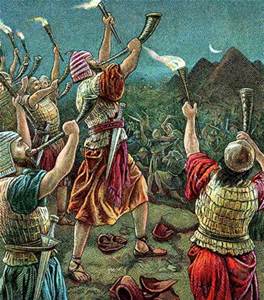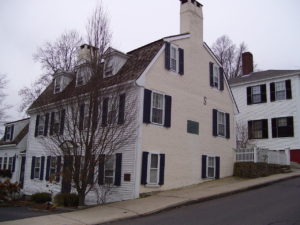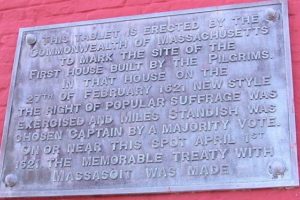Leyden (or First) Street in Plymouth is historic for many reasons. One such reason is that it is where the common (or first) house was built by the Pilgrims. The white house seen in the picture is Lot #1 historically. It is on this spot that the first free election took place on February 17 (or new style today; the 27th), 1621. That election was for Myles Standish to function as military commander. But wasn’t he hired for that purpose? Yes, but the act of electing him was critical and an extension of their view of self-government. It is important and significant that it was the citizen that established the original militia of 1621.
On February 27th the establishment of the first citizen militia in America will be commemorated. The Pilgrims were unique in that the military commander was voted in by freemen (at that time in 1621, only males voted to represent their families and themselves). This occurred while they were going through a very difficult winter with half their number dying, burying them in secret graves. What caused them to establish their military orders in February during the winter is portrayed in the diary of the Pilgrims called Mourt’s Relation (probably written by Edward Winslow and William Bradford).
“Friday, the 16th (of February)… one of our people being a fowling, and having taken a stand by a creek side in the reeds, about a mile and a half from our plantation, there by him twelve Indians, marching towards our plantation, and in the woods he heard the noise of many more. He lay close till they were passed, and then with what speed he could he went home and gave the alarm. So the people abroad in the woods returned and armed themselves, but saw none of them; only, toward the evening, they came made a great fire about the place where they were first discovered. Captain Miles Standish and Francis Cooke being at work in the woods, coming home left their tools behind them; but before they returned, their tools were taken away by the savages. This coming of the savages gave us occasion to keep more strict watch, and to make our pieces and furniture ready, which by the moisture and rain were out of temper.”
 Self-defense is a natural God-given right that dates back long before the Pilgrims. The 1252 Assize of Arms of King Henry III was based on the Assize of Arms of 1181. These declarations were for freeman to have arms to defend themselves and the King. However much further back than that was the initial citizen militia of the ancient Israelites. When the Rev. E. C. Wines, whose colossal work Commentaries on the Laws of the Ancient Hebrews fully documents the ancient Israelite law and culture, described a conversation he had with John Quincy Adams, he wrote “He drew, with a luminousness and power peculiar to himself, a contrast between Hebrew government and the other ancient oriental polities…. But that which he chiefly insisted on, was the fact, that all the rest were founded on force, this only on consent.”
Self-defense is a natural God-given right that dates back long before the Pilgrims. The 1252 Assize of Arms of King Henry III was based on the Assize of Arms of 1181. These declarations were for freeman to have arms to defend themselves and the King. However much further back than that was the initial citizen militia of the ancient Israelites. When the Rev. E. C. Wines, whose colossal work Commentaries on the Laws of the Ancient Hebrews fully documents the ancient Israelite law and culture, described a conversation he had with John Quincy Adams, he wrote “He drew, with a luminousness and power peculiar to himself, a contrast between Hebrew government and the other ancient oriental polities…. But that which he chiefly insisted on, was the fact, that all the rest were founded on force, this only on consent.”
It is interesting that Wines wrote: “The mystic harp was touched when the pilgrims set foot on Plymouth Rock. Its quivering strings discoursed their most eloquent music. The burden of the notes was, – human freedom; human brotherhood; human rights; the sovereignty of the people; the supremacy of law over will; the divine right of man to govern himself.”
 Continuing from the Pilgrim journal: “Saturday, the 17th day, in the morning, we called a meeting for the establishing of military orders among ourselves; and we chose Miles Standish our captain, and gave him authority of command in affairs. And as we were in consultation hereabouts, two savages presented themselves upon the top of a hill, over against our plantation, about a quarter of a mile or less, and made signs unto us to come unto them; we likewise made signs unto them to come to us. Whereupon we armed ourselves and stood ready, and sent two over the brook, towards them, to wit, Captain Standish and Stephen Hopkins, who went towards them. Only one of them had a musket, which they laid down on the ground in their sight, in sign of peace to parley with them. But the savages would not tarry their coming. A great noise of a great many more was heard behind the hill; but no more came in sight. This caused us to plant our great ordinances in places most convenient.
Continuing from the Pilgrim journal: “Saturday, the 17th day, in the morning, we called a meeting for the establishing of military orders among ourselves; and we chose Miles Standish our captain, and gave him authority of command in affairs. And as we were in consultation hereabouts, two savages presented themselves upon the top of a hill, over against our plantation, about a quarter of a mile or less, and made signs unto us to come unto them; we likewise made signs unto them to come to us. Whereupon we armed ourselves and stood ready, and sent two over the brook, towards them, to wit, Captain Standish and Stephen Hopkins, who went towards them. Only one of them had a musket, which they laid down on the ground in their sight, in sign of peace to parley with them. But the savages would not tarry their coming. A great noise of a great many more was heard behind the hill; but no more came in sight. This caused us to plant our great ordinances in places most convenient.
 The plaque on the house (lot #1) in Plymouth commemorates this significant act with these words, “This tablet is erected by the Commonwealth of Massachusetts to mark the site of the first house built by the Pilgrims. In that house on the 27th of February 1621 new style the right of popular suffrage was exercised and Miles Standish was chosen captain by a majority vote.” They continued to vote and confirm Myles Standish each year as captain, including the year 1643. The 1643 establishment of military orders likely describes what was done in 1620 and states some of the following:
The plaque on the house (lot #1) in Plymouth commemorates this significant act with these words, “This tablet is erected by the Commonwealth of Massachusetts to mark the site of the first house built by the Pilgrims. In that house on the 27th of February 1621 new style the right of popular suffrage was exercised and Miles Standish was chosen captain by a majority vote.” They continued to vote and confirm Myles Standish each year as captain, including the year 1643. The 1643 establishment of military orders likely describes what was done in 1620 and states some of the following:
- That the exercise be always begun and ended with prayer. 2. That there be one procured to preach them a sermon once a year, at the election of their officers… 3. That none shall be received into this military company but such as are of honest and good report… 9. That every man that hath entered himself upon the military list, and hath not sufficient arms, and doth not or will not procure them within six months next ensuing, his name be put out of the list…. 14. That all that shall be admitted into this military company shall first take the oath of fidelity…
Note that the establishment of a militia was surrounded by prayer as well as the articulation of what the Scriptures noted about the need to defend liberty as brought forth by a sermon of the clergy. In addition, the importance of good character is emphasized. In an act of self-defense, on “Wednesday, the 21st of February, the master came on shore, with many of his sailors, and brought with him one of the great pieces, called a minion (canon), and helped us to draw it up the hill, with another piece that lay on shore, and mounted them, and we had a saller and two bases…
At the time, they had no way of knowing that the peace that would be established with the Wampanoag would last more than five decades. As emulated by the Pilgrims we are to work for peace as the Scriptures admonish us in Romans 12:18: “If it is possible, as much as depends on you, live peaceably with all men.” Aggression and violence is not the method by which the Kingdom of Heaven comes to earth. However, we are commanded to prepare to defend liberty when needed for as Jesus instructed: “He that hath no sword, let him sell his garment and buy one.” (Luke 22:36)







